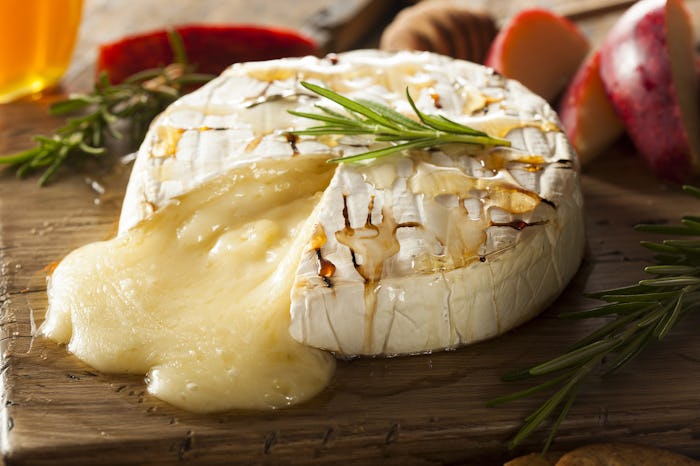Life

Actually, You *Don't* Have To Turn Down Baked Brie While You're Pregnant
Cheese inspires a certain breed of illogical behavior in people. I know this because while I'm otherwise not crafty at all, I have actually made cheese. Granted, it was mozzarella, but dang it, I made it with my own two hands and deemed it good. I pride myself on my elaborate cheese boards piled high with humboldt fog, manchego, quince jam, and charcuterie. Pregnancy puts a damper on my party, though. The directive, "don't eat soft cheese," is a big bummer. But what about cooked cheese dishes? Can you have baked brie while pregnant?
The danger with soft cheeses lives in their inherent risk to harbor the dangerous listeria monocytogenes bacteria. While adults can contract listeria and fight it off while avoiding lasting damage, according to the Food and Drug Administration (FDA), it can be dangerous or even deadly to a developing fetus because it is difficult to treat and can aggressively affect developing tissue. However, the bacteria is pretty easy to kill via pasteurization and cooking. According to the European Food Safety Administration, heating soft cheeses like brie or roquefort to around 160 degrees Fahrenheit will succeed in killing the dangerous bacteria in the food. So long as your baked brie is super hot in the center, it's safe to chow down.
The truth is that listeria is so dangerous, the Centers for Disease Control and Prevention (CDC) keeps a running tab on their website that is there purely to list listeria outbreaks. Unfortunately, fetal death is listed. But there are also hospitalizations and other health-related consequences to the outbreaks. This isn't just happening in cheap, store-brand camembert, either. It can just as easily be found in the stuff at the fancy shops charging 40 pieces of silver and a kidney for a wheel of brie. Listeria does not discriminate.
Listeria is nasty. It causes fever and diarrhea, confusion, convulsions, and headaches, noted the CDC. It can cause a loss of balance or muscle aches and weakness. It's only contracted by eating contaminated food, so it is mostly preventable. It's treated with strong antibiotics that carry their own inherent risks, and is more likely to affect the very young, very old, pregnant, or otherwise immunocompromised people.
When you're not pregnant, you can live on the edge. Eat tons of raw brie, soft blue cheese crumbled over your rare burger, scrape your cracker against the gooiest bits of the creamy goat cheese. However, this is a no-no when you're pregnant, but if you heat it, and therefore make it even meltier, it's all good. And let's be completely honest, what cheese isn't made better by bringing out all of its qualities by melting it and watching the strands of this gift of the dairy gods pull apart as they reach your mouth? Pro tip: they all are.
So, can you eat baked brie while you're pregnant? Absolutely, but why limit yourself to just baked brie? While brie layered with honey and walnuts wrapped in puff pastry and baked is a classic and delectable, it's not the only option for hot cheesy goodness. If you're craving soft cheeses and you're also baking something in your own oven, why not consider a hot blue cheese dip? Have you ever had deep fried camembert? Did you even know that's a thing? It is. What about fresh from the oven feta cigars? All wrapped up in crispy phyllo dough and so salty your pregnant mouth will thank you.
In all seriousness, though. Foods like soft cheeses, luncheon meats, and unwashed produce are a real danger for pregnant women. Make sure you heat your meats and cheeses to 160 degrees Fahrenheit, and wash the heck out of your fruits and veggies — even if the lettuce bag says "triple washed." It's best to make it "quadruple washed." After that, tie a napkin round your neck and tuck in.
Check out Romper's new video series, Romper's Doula Diaries:
Watch full episodes of Romper's Doula Diaries on Facebook Watch.